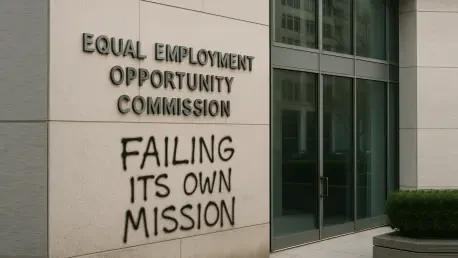What happens when the guardian of workplace fairness stands accused of the very bias it vows to eliminate? The U.S. Equal Employment Opportunity Commission (EEOC), the federal agency tasked with enforcing anti-discrimination laws, finds itself at the center of a startling lawsuit. An enforcement manager, an Asian woman of Indian origin, claims she was bypassed for a promotion due to gender, race, and national origin bias. This case, unfolding in a district court, casts a harsh light on an organization meant to be a beacon of equity, prompting a deeper look into whether it can uphold its mission when internal cracks begin to show.
The Weight of Irony in a Watchdog’s Dilemma
The EEOC was created to champion fairness under landmark legislation like Title VII of the 1964 Civil Rights Act. Its role is to ensure that no worker faces discrimination based on identity or background. Yet, when an experienced employee within its ranks alleges bias in a promotion decision, the contradiction stings. This lawsuit, centered on the denial of a field director position in the New Orleans office, isn’t merely a personal grievance—it’s a public challenge to the agency’s credibility.
The significance of this case lies in its broader implications. If an organization dedicated to eradicating workplace discrimination struggles with internal allegations of the same, public trust in its authority could erode. This isn’t just about one employee or one promotion; it’s about whether the EEOC can serve as a model for the principles it enforces across the nation.
Unpacking the Claims of Bias
At the heart of the legal battle, titled Kantan v. Burrows, is the plaintiff’s assertion that she was unfairly passed over for a less experienced, U.S.-born male candidate. She points to specific remarks about her accent made by the selecting official as evidence of prejudice tied to her national origin. Beyond that, she alleges the chosen candidate was deliberately “groomed” for the role, suggesting a process tainted by favoritism rather than merit.
The emotional toll of such claims cannot be understated. For an enforcement manager who has dedicated years to upholding anti-discrimination laws, facing perceived bias within her own workplace strikes a personal blow. Her account paints a picture of exclusion, where cultural differences became a barrier rather than a strength, raising questions about how deeply equity is embedded in the agency’s culture.
The EEOC’s Defense of Fair Process
In response, the EEOC stands firm on the integrity of its selection process. The agency argues that a four-person interview panel evaluated candidates on a 100-point scale, with the selected male candidate earning the highest marks across the board. The plaintiff, despite her technical expertise, ranked lowest, a decision the EEOC attributes to the panel’s emphasis on leadership skills over specialized knowledge.
This defense highlights a common tension in modern hiring practices. Leadership, often seen as a subjective “soft skill,” can outweigh years of technical experience in promotion decisions. The agency insists that the selecting official relied solely on the panel’s objective scores, framing the outcome as impartial and consistent with standard protocols.
Voices from the Field Weigh In
Legal scholars and workplace equity advocates have taken note of the case’s complexity. One labor law expert commented, “When an agency like the EEOC faces discrimination claims, the stakes are uniquely high—they must exemplify the standards they impose on others.” This perspective underscores the symbolic weight of the lawsuit, where any perceived misstep could be interpreted as hypocrisy.
Historical patterns add context to the current dispute. A settlement in 2023 with a Black female employee over pay disparity compared to a White male colleague suggests this isn’t an isolated incident. Such recurring issues hint at systemic challenges within the EEOC, even as it defends its structured hiring metrics against the plaintiff’s personal experiences of bias, including derogatory comments about her identity.
Broader Lessons for Workplace Equity
This lawsuit offers critical takeaways for organizations beyond the courtroom. Companies must prioritize transparent promotion processes, regularly auditing for unconscious bias, especially when subjective criteria like leadership are weighed heavily. Blind evaluations in early candidate screenings could help minimize the impact of personal characteristics, ensuring decisions hinge on qualifications alone.
Employees, too, can learn from this case. Documenting interactions and decisions meticulously can strengthen claims of discrimination if personal remarks or unfair treatment arise. Moreover, fostering open conversations about equity within workplaces may prevent grievances from escalating into legal battles, a practice the EEOC itself might reflect on as it navigates this public scrutiny.
Reflecting on a Troubled Legacy
Looking back, the clash between the plaintiff’s allegations and the EEOC’s defense reveals a profound tension between personal perceptions of bias and institutional claims of fairness. The lawsuit, with its focus on remarks about accent and allegations of favoritism, paints a vivid picture of individual struggle. Meanwhile, the agency’s reliance on panel scores and leadership criteria underscores the challenge of proving discriminatory intent in structured systems.
Moving forward, organizations like the EEOC must consider rigorous internal reviews to align practices with their public missions. Establishing independent oversight for hiring decisions could prevent future disputes, while training on cultural sensitivity might address personal biases before they manifest in professional settings. As the case awaits a court ruling on the summary judgment motion filed earlier this year, it serves as a reminder that even champions of equity must constantly examine their own foundations to ensure they stand firm against the very issues they fight.









